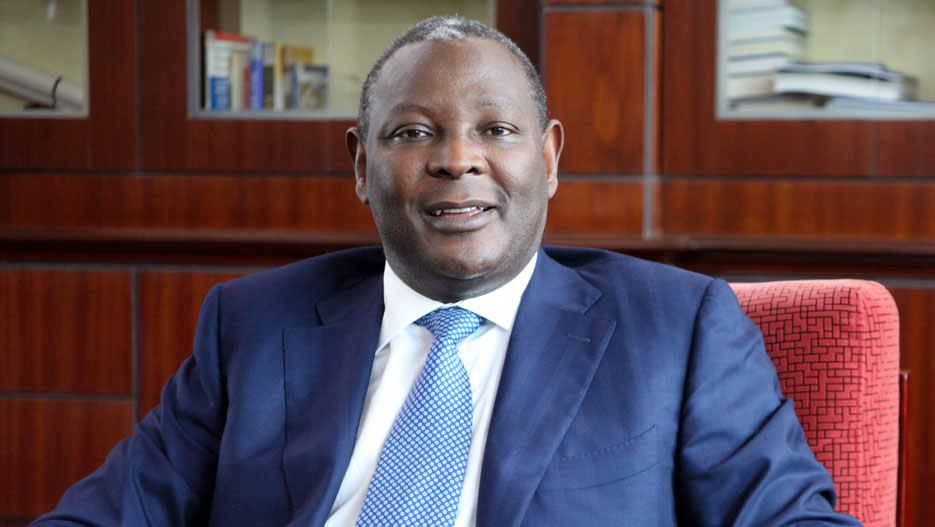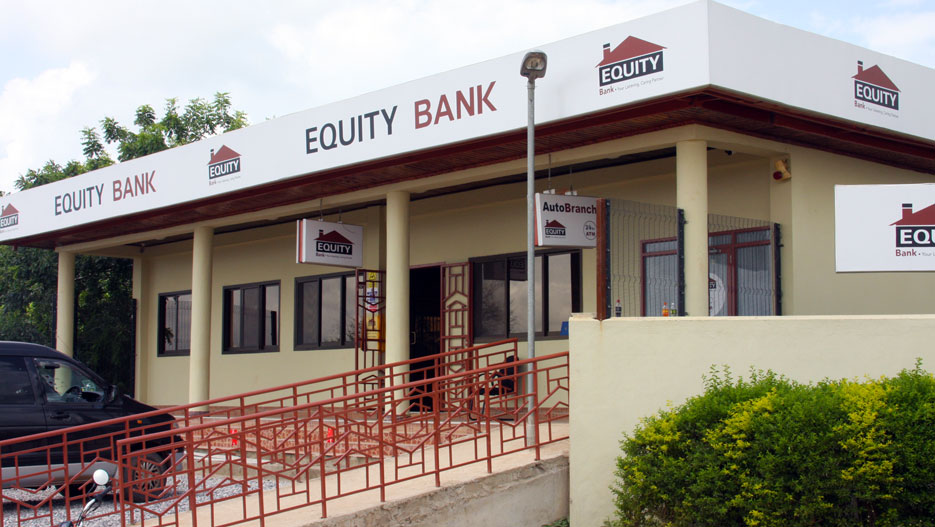Equity Bank: One of the Leading Banks Discusses the Banking Sector in Kenya
Dr James Mwangi discusses the banking sector in Kenya and gives an overview of Equity Bank, the largest bank by market capitalization, profitability and customer base in the country.
Interview with Dr James Mwangi, CEO and Managing Director of Equity Bank

What is your assessment of the Kenyan financial and banking sector for 2016?
Kenya has 43 banks in all of the banking industry, as well as a 164 deposit taking micro finance institutions. We have 9 micro finance institutions and we have a functional capital market with 18 participants. By African standards, it is one of the deepest and most elaborate markets in both the capital and financial market. However globally it becomes a very small financial market. Not deep enough and not large enough for the kind of projects that we want. In terms of supervision and solidity, the Kenyan banking industry is among the best due to our strong regulations. There are issues regarding whether we have too many banks in a fairly small market and whether evolution will result in consolidation but we have a fairly solid financial sector. That is why you have five of the global banks being able to be participants in the local domestic market.
Do you have any aspirations to merge or partner with other players locally?
We avail to our clients our huge balance sheet which they can leverage on with a single lending limit of approximately 200 million dollars.
Equity Bank is the largest bank by market capitalization, profitability and customer base. We provide an anchor position in the financial sector and we have been consolidating the market. We are now a 15-16% profit shareholder of the total banking industry and that gives us the levers to be able to play a leadership role in the market. We are very strategically positioned as well as positioned to provide leadership, even if it is in consolidation. Lastly, we have a role of leadership in financing infrastructure in the country, whether it is leading syndications or consortiums so as to be able to provide adequate financing of the mega projects of development.
Can you give us an example of a mega projects that you are financing in 2016? Are you looking to syndicate with other banks to finance these mega projects?
The very significant infrastructure projects happening in the country at the moment are electricity and distribution. We are an active and significant player in power distribution, and particularly the last mile of power distribution. The second area that we are significant players in is in league with development such as airports. We are financiers to contractors who are taking on those massive projects. There are also other opportunities, particularly for the envisaged pipeline for Lamu to the new found oilfields in northern Kenya. That provides an opportunity for Equity Bank to play a role in a consortium or syndication with the global banking institutions to enable a roll out of such a huge opportunity. There is also development in the private sector where we are seeing significant investment in agro-processing and the food processing industry. We are seeing opportunities for manufacturing, particularly in the manufacturing of light industry. Essentially, we are seeing these increasing opportunities coming along as the country becomes a middle income economy.

Do you think it’s easy for SMEs to get access to capital? Usually, SMEs find it difficult as they cannot go to the stock exchange. They have to go to the bank. What is your policy regarding SMEs?
SMEs really are the face of indigenous entrepreneurship within the East African region. They represent the capital and world ownership and creation of the local population. But the success of a SME in getting credit facilities from established banks is heavily dependent on the governance structure of family businesses. Secondly, there is their level of formalization: how formal are they in terms of reporting, policies and projects in regards to the risk of credit? Lastly, there is the level of integration with multinational supply chains and ecosystems. The best positioned SMEs are the ones that are in the value chain or are very well established conglomerates with governance structures that are already checked in the market and are consolidated for them. We try to structure them and place them within the ecosystem to ensure that the right buttons are pushed so as to get them aligned to the public good and thereby benefit from public deposits. For a family unit or a personal business, it creates an open risk of conflict that arises when governance structures are not sorted out.
What is your policy regarding governance?
Globally, we are ranked as the 4th best bank in returns on assets and return on equity and the 68th most solid bank in the world.
We are very strong in terms of governance. As an institution we are looked upon as the best example in terms of governance. We threw out things like insider trading in 2002. We have created an environment where the board is independent of any conflict of interest within the organization. This enables the board to make very strong policies. We have become a role model institution with the best banking practices within the region. Fixing the region and getting the governance structures right, then everything else will start falling into place. Essentially, we needed to focus on governance. We have a trusted position from the depositors. We leverage on depositors money for our lending. That is in one way or another protected and framed within the strongest governance structure possible so as to maintain that trust relationship.
Let’s talk about the services that you provide and where you have an edge in the market. Could you tell us about Equitel?
The bulk of our business is transacted through Equitel. Equitel is a name that people know and they provide us with a credible, reliable and secure banking infrastructure. That has enabled us to be a world leader in mobile banking. What we have essentially done is to take advantage of the sim card to access the secure elements and we have been able to encrypt our banking better as it moves from the data centre to the phone and indeed guarantees the security of the banking information. Secondly, we have the ability to adapt the banking software on a sim card and then we have the capability of converting cheaper phones to act like smartphones when it comes to mobile banking because of the routing of the software on the sim card. It becomes more like internet banking. Next is the convenience that these standards deliver because all customers then have an opportunity for self-service with unlimited access to their banking or store value in the sense that they have the bank with them 24/7 on their terms. The next convenience is the ability to deliver it at a fairly affordable cost because this has no fixed cost in the terms of infrastructure and it is a shared cost with the owner of the mobile phone. That has been a bonus to not only be accessible and convenient in offering, but also fairly affordable.

Are you going to replicate this technology and try to sell this technology abroad? How else can you use it outside your parameters?
Mobile devices have become our delivery terminal of choice. Essentially what we have done is to replicate the success of Kenya in the 6 other countries that we operate in. We have formed partnerships with mobile network operators so that we can leverage on their infrastructure without having to incur the cost of infrastructure. That leaves the bank with a lean and low cost infrastructure, while at the same time enhancing the sticking ability on the MVNO (Mobile Virtual Network Operator) and significantly reducing their problems in terms of users.
Can you tell us a bit about your similar banking agencies having the ability to control money within the shop? That is important from some remote areas and not just in Kenya but in other places too.
Again we are the global leader in agency banking. Agency banking entails basically using little outlets to provide banking services such as cash transactions, deposit or withdrawal, account balance enquiries, mini statements, origination of loans or origination of bank assurance. Essentially, this demystifies what banking is all about. Banking is then almost commoditized and offered in a very informal way and not in the traditional structured brick and mortar facilities of a bank. Lastly, there is the convenience because an agency enables us to bridge the last mile. We are in every village and shopping centre. On every street corner you will have an agent and the convenience that they offer as well as the flexibility and most importantly the demystification of what banking is. If banking is offered at the same place where you buy your groceries, it will make it less of a daunting task. People can now freely interact with something that used to be considered elitist.

You mentioned that you will introduce this in different countries but are you thinking of converging with other banks that are in other places in Africa where they don’t have this model? Do you exchange technology or do you want to be an innovation leader and spread out?
Of course as an innovation leader we chart the path for everybody, but banking is easily copied and followed. If you look at Kenya, we only have 68% of the agency network. The other banks have woken up and now control the other 32%. When it comes to the DRC, Congo, Uganda and Tanzania, we have rolled out agencies and mobile banking and we are seeing other banks copy us because of the convenience and ability to lower the cost as this is a valuable cost infrastructure. The most important is the convenience that mobile banking and agencies owe to the customers and the reduction in the cost of accessing banking. You no longer need public transport to get to the bank. You no longer need to waste a whole day to get to wherever the bank is situated. Banking is almost being reduced to a lifestyle perk. Whatever you want to do you are now able to do, particularly when you combine this with merchant banking.
What does Equity Bank do in terms of CSR (Corporate Social Responsibility)?
Equity Group has offered its massive infrastructure to do some good in society. We appreciate that doing good and doing well can be done simultaneously and they can complement one another. We have offered the branch network, our 8000 staff members and our capabilities in IT to the donation and development of the community and said: “this is infrastructure that is spread out through the region of interest. You can use it”. Essentially, today we are the principle distributors of humanitarian cash receipts by all donors whether it is DFID, FSD, Wild Food program, EFAD and the Kenyan government on all social payments to orphans, vulnerable persons and the aged. All of that is submitted through the bank using that infrastructure. We have realised that this is impacting investment in society. This is what you should see as collaborative effort, almost redefining philanthropy and redefining humanitarian support.
The second area that we have really focused is saying that we can we offer a platform for convergence of likeminded people who can use the infrastructure of the bank. That prompted us to form Equity Group Foundation which is the first foundation in Africa that focuses on aid areas. The first area is health, second is financial access, third is entrepreneurship and financial sales, fourth is agriculture, fifth is innovation and sixth is scholarships and leadership development within society. What we have seen is that the foundation provides the platform where you can achieve a convergence of likeminded efforts and collaborative efforts. Out of that we have now managed to train 1.4 million women on a 13 week financially intensive program over the last 3 years. We have been able to provide scholarships to 12 377 orphans for their secondary education and we are maintaining 3 700 students in our public universities through internship. Lastly we have 350 of our best Kenyan students in global universities. That is really an effort that has pleased us. At the same time, we have been able to transform 560 000 rural farmers into sustainable agribusinesses and able to accommodate their lifestyle including a social investment.
We are seeing that you can combine doing well as a commercial entity with doing some good for society and leveraging on the massive capabilities that incorporate us. We are very proud that we have brought these innovations to bear and we are now seeing significant shifts of development agendas to collaboration with corporates that have massive infrastructure capabilities.

What are your policies regarding companies coming in from abroad?
What we have done is to develop very strong competencies and services for the international companies operating in the region. Firstly, we provide them with a corporate internet software called Misys. Then, we provide cash management and liquidity management using our Biznet network. That makes them almost able to manage their own system in terms of liquidity, cash management and infrastructure of corporate internet banking. We then integrate this with our Equitel offering and our mobile banking capability then becomes available to their distribution network whether it’s the wholesale distributors or small outlets, at the same time supporting their employees using mobile banking so that they can process their salaries and distribute them without really requiring the support of the bank. The second facility we avail to them is our huge balance sheet which they can leverage on with a single lending limit of approximately 200 million dollars. That enables them to be able to settle without having to do syndications or consortiums for their financial requirements. Lastly, we avail to them our huge global correspondent banking network whether American, European, Asian or South African. That capability makes them operators in their homes or at least able to link to their favourite financial service back home. We also provide them with local knowledge. We have a fairly competent global leadership team that has significant local knowledge that we make available to these multinational companies. That has been how we have been able to link ourselves. We also help them develop SMEs that constitute their ecosystem or supply chain distribution network.
What are the main challenges to be faced by Kenyan Banks?
I believe our biggest challenge is building the capacities of the SMEs in the region. I am talking about family businesses that are now passing into the second and third generation and their capabilities in terms of succession planning, capacity and knowledge within the SMEs, as well as the modernization of SMEs in transformation whether through technology or innovation. Collaborative effort and partnership will be required to enhance that. Next is the transformation and modernization of the business environment on the African continent. Time has come for things such as mechanization and modernization of agriculture. The transfer of skills, competencies and entrepreneurial skills to support the investing community and the business community in the region is significant. Next is the opportunity to integrate with a globalized world so that Africa and East Africa in particular don’t continue to stand alone in a highly globalized market. Multinationals would have a huge role and not only the transferring skills but also of being the link to a globalized market.
What about Equity Bank itself? Does it face any challenges?
As a bank, we are very well capitalized and we have the best risk management framework possible. We have attracted global leadership skills. We have been able to use the latest technology and innovation platform. We are one of the best performers and globally we are ranked as the 4th best bank in returns on assets and return on equity and the 68th most solid bank in the world. In terms of our organization we are doing very well. There is always room for collaboration and partnership to extend these capabilities. Where we would really like to see collaborative efforts is in using the capabilities and competence we have and to be given an opportunity by the multinationals to demonstrate what we can do as opposed to them only looking at familiar banks from their home countries. That is our ideal that will require a lot of support. We may not be a global name but in terms of capabilities and competencies we are in the top 1000 banks hence the need to be given an opportunity. It’s a huge opportunity for collaboration. Most multinationals coming into Africa would like to do good for society but they don’t know how. We would like to offer ourselves and our infrastructure for a collaborative effort in solving some of the social problems in Africa. The concept of the exchange of ideas with multinationals can only enhance the capabilities of an organization like Equity Bank. We see an opportunity to exchange knowledge particularly in innovation and use of technology as well as global payment capabilities. Not necessarily solving problems but enhancing and maybe deepening what we are already doing.

What is your assessment of the economy of Kenya?
The Kenyan economy has started reaping the dividends of 25 years’ worth of sustained reforms in the economic, social and political sector. That culminated with a new constitutional dispensation and organization of the economy and the separation of the three pillars of government: judicial, registrar and the executive branch. The reforms on the policy front have led to a very stable micro economic development in the country. This has accelerated the growth rate over the last 10 years and we moved from a negative growth rate to a projected 6.2% growth rate which will be more than double the growth rate of sub-Saharan Africa in terms of GDP. We have now started seeing significant direct foreign investments because of the East African community. We are no longer the Kenyan market because we are now positioned within an East African market with a population of a 130 million people. We have seen the economy graduate to a middle income economy and a significant increase in the disposable income of the average population. This creates a sizeable domestic market using that disposable income. We have seen stability in the 3 biggest micro economic places. Inflation, exchange rate, interest rates and that stability has significantly helped to support and integrate the Nairobi exchange with the global stock exchange. We have seen rapid and significant growth of the financial sector compounded at 16% over the last ten years and that has created significant size in terms of players in the sector. What we have seen lately is significant investment in infrastructure whether its airports, harbours, energy development, railways or roads and particularly with a view to linking the different regions and countries and making Kenya a hub. We see a huge opportunity of sustained economic growth within the African region. With the discovery of huge reserves of gas in Tanzania and reserves of oil in Uganda as well as decent commercially viable oil finds in Kenya, we are seeing the region being redefined in terms of its offering and attractiveness. The most significant factor is the democratic space that Kenya has been able to offer by creating an open and transparent society. However challenges do remain. We still have to contend with the cost of doing business and we will continue to need it to be reduced much lower with further and greater development of infrastructure. We still need greater development of competencies and capability of the human capital in the region by enhancing and making education more relevant to today’s skills requirements. We need to deal with social vices that hold communities and societies down. Those are some of the things that still need to be dealt with. It’s not just an open optimistic picture. I think we could do with greater investment in infrastructure and we can continue enhancing transparency and integrity in government leadership.
Where would you like to see the bank in the next 3 to 5 years? What is your vision for the future?
We hope that the successful execution of the current strategies and plans will enable us to become a significant player in terms of size in the East African region. We think that in 4 to 5 years we will have doubled our customer base and reached 20 million customers and hopefully reaching a 10 billion dollars assets base within the next 5 years. That would double the size of the bank. I think that is the impact that Equity Bank will have, particularly in the transformation of lives, neighbourhoods and communities in which it operates, whether that is using banking products or using the intentions of the foundation. That is where the focus will be: in nurturing and supporting local entrepreneurship so that indigenous people can play a significant role in world creation within the country, as well as employment creation so as to deal with the unemployment situation. Hopefully, we will also have supported the SMEs that are banking with us to become regional or even multinationals and to really open the trade routes for them within the 6 countries where we operate. We hope to set up in Ethiopia within the next 5 years, thereby increasing the size of the market that we operate in to about 220 million, and when we add the DRC, we hope to reach 350 million people. That is the picture I see: one of a market leader in the financial sector offering a wide range of diversified financial offerings and more importantly, providing an anchor position for the SME sector.